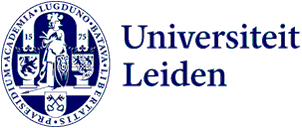
‘More is possible than you think’: stimulating Open Science and Recognition & Rewards
Greater transparency in science. Broader career paths. Less work pressure. A dynamic conversation at the Faculty of Social and Behavioural Sciences (FSW) focused on these goals. A unique research agenda was also presented to Rector Magnificus Hester Bijl and Dean Paul Wouters.
The session was organised as part of Academia in Motion (AiM). This Leiden University initiative aims for an open and collaborative university community that prioritises quality over quantity, recognizes and rewards all contributions, and embraces inclusiveness, and leadership.
How best to achieve this will vary between faculties. AiM groups are therefore being set up in each faculty. Their purpose? To identify actions that suit their individual working environment and research domain.
Create energy
'For me, the goal of this afternoon is to create energy in our faculty,' said Dean Paul Wouters to the group of some 25 FSW employees. He emphasized that the objective of AiM is not to add work but rather to transform the way of working.
'That won’t always be easy. It will take time. The trick is to do it in such a way that we don’t throw away our current strengths but at the same time lay the foundations for a fundamental transformation of how we work.'
'If you don’t have any breathing time, you can’t even think'
In the subsequent conversation, the group took stock of existing activities that align with the goals of AiM. Initiatives to strengthen teams and rethink structural elements such as performance reviews came to the surface, and challenges such as already-high workloads and a constant drive to do more were aired.
'If you don’t have any breathing time, you can’t even think,' said one participant, while another said: 'It doesn’t always have to be perfect. Removing some things can increase the quality.'
Blockers to acting
A striking aspect of the conversation was the realisation that sometimes-assumed blockers to acting, such as red tape, don't exist. 'Maybe we need to be more explicit about showing our faculty and community that there are possibilities, and we can use them,' said Wouters.
The session concluded with the presentation of the NeurolabNL Young research agenda to Rector Magnificus Hester Bijl and Dean Paul Wouters. This collection of questions that young people would like to see answered was co-created by a group of Leiden University researchers — Annelinde Vandenbroucke, Eveline Crone, Marieke Bos, Dietsje Jolles and Kiki Zanolie — along with seven other Dutch universities and various social partners. The agenda is an example of Citizen Science in action and — more broadly — of the positive impact these types of activities have on the university and society.
'It's essential to value not only the one-dimensional grants but the broader spectrum of activities that are relevant for our university and academic community,” said Rector Magnificus Hester Bijl. "Doing so requires discussions and dialogues like this.'
-

Presentation of the research agenda to Hester Bijl and Paul Wouters. -
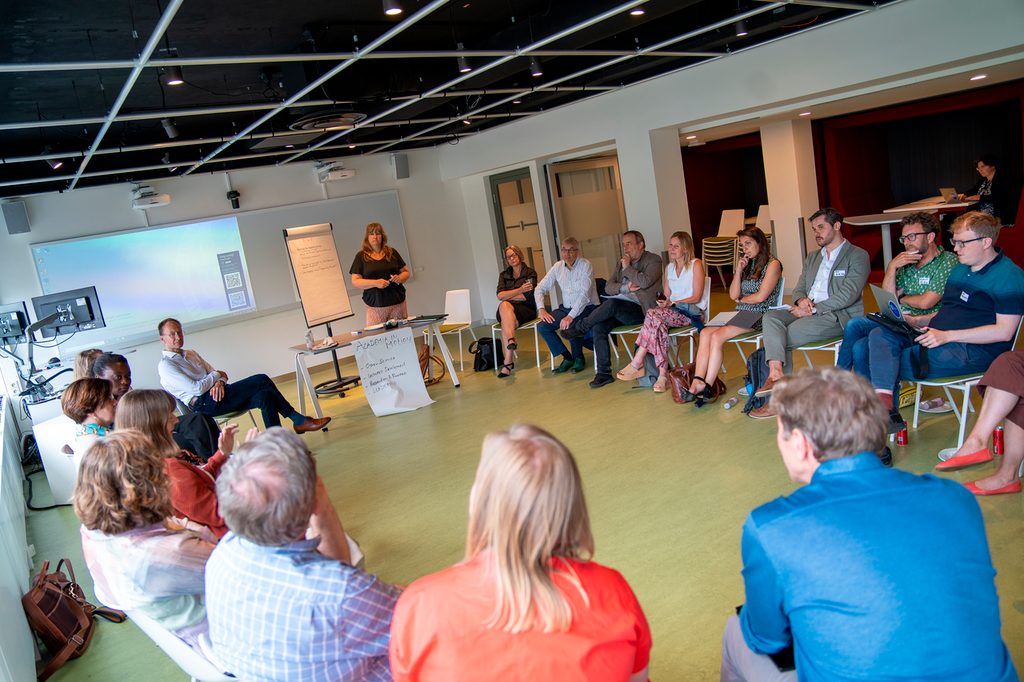
-
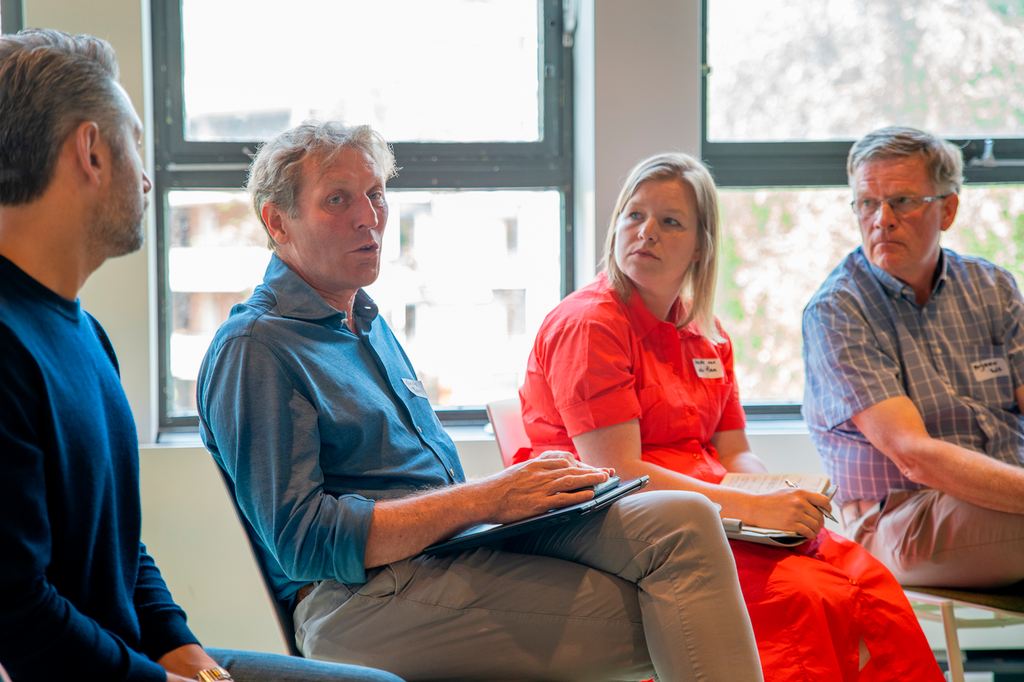
-

What’s next?
'What I’d really like to achieve in a couple of years – maybe even one year – is that teachers feel inspired, more enthusiastic and facilitated to develop professionally, to innovate and to experiment. And that they find the time for this,' said Kristiaan van der Heijden, Vice-Dean at FSW.
To make this happen, an AiM working group will be set up in the faculty after the summer. All other Leiden University faculties are also activating AiM groups.
Get involved?
Would you like to get involved in, or learn more about, AiM? That's possible! Our Academia in Motion Festival on 2 November is a wonderful opportunity to engage with colleagues and academic experts who are working on themes such as Open Science, Recognition & Rewards, and Leadership. They can support you in getting the discussion going or setting up initiatives in your team.
It's also possible to reach out to the two AiM coordinators: Cas Henckens for Recognitions & Rewards and Karlijn Hermans for Open Science.
What did participants take away from the session?
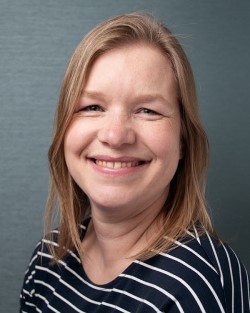
Ineke van der Ham
Professor Technological Innovations in Neuropsychology
Why did you make time for this session?
'I think it is very important for how we are going to develop as an organization and how science is also going to develop as a sector. We have to move forward. If you look at societal developments, if we continue doing what we've always done then we'll become redundant. We can no longer say ‘only research is important’. A lot of things are important.'
What were your impressions from the discussion?
A lot was said. I like that a lot of things are already happening. I also hear concerns that people see a lot of hurdles. There needs to be money and time made available for the things that need to be prioritised. We don’t always have that at the moment but there may also be more possible than you think. You really do have room to play and move forward. I think that's very nice, as well as the exchange of ideas. People are here from all corners of the faculty, people who don't talk to each other that often. It's really nice that we can work together on this.’
What action are you taking?
In our own team we're going to do a pilot with performance appraisals. There are a number of people who think 'yes, but that is not possible for us' or 'does that work?' So we're also going to look and ask ourselves ‘is that right’ or ‘do we need to make adjustments?’. If it works, then we can share.
What tips do you have for others who want to innovate and experiment with Open Science and Recognition & Rewards?
What works for us is to just have lots of conversations about it. What problems do we have and what might this solve? Making it discussable and sharing expertise is very important.
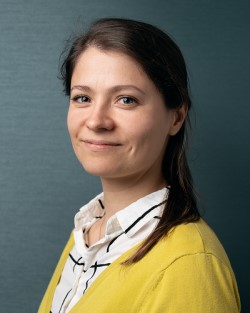
Anne Urai
Assistant Professor Cognitive Psychology
Why did you make time for this session?
I notice how these kinds of big policies really do impact daily practice. For example, how I supervise my students but also my own career development. So I like to be able to sit at the table and have a say when these kinds of big issues are being discussed. There are also a lot of these discussions within our unit on a smaller scale. I can compare that to what's happening in other units and in other institutions as well.
What did you find interesting today?
I find Recognition and Rewards interesting from a couple of angles. I'm sitting on selection committees and I notice that the way in which you shape that process depends very much on what you give more weight to: only publications or also experiences outside science or more outreach. Sometimes who you offer a job to is quite difficult if you suddenly look at it through the lens of Recognition and Rewards. Then it's no longer so automatically given to the person with the highest H-index. As for Open Science, it's something I try to do a lot in my work, and I also find that interesting to think more about. For example, about how we can not only properly store and curate our data for others, but that we ourselves make more use in our research of that existing data. How can we use all that data to answer new research questions?
What was one key take-away?
Things are running in parallel, at all sorts of levels, that you don't always know about. There were quite a lot of things that I had thought up with colleagues while, somewhere in the faculty, an official group was already working on them and I was completely unaware. That made me think that it's very good to sit together. We can share things to prevent people from reinventing the wheel each time separately.
What advice would you give to someone who wants to get more involved?
The Open Science Community Leiden is a very nice start. They have a lot of webinars and you can easily meet people. Finding buddies and allies is almost always the first step for me to try to accomplish something. That gives a lot of enthusiasm and energy to work on things. With help from others you have the idea of ‘I don't have to do that alone’ and it can also go beyond just your own department. That's also a bit of a can-do mentality that maybe we could have a bit more altogether.
